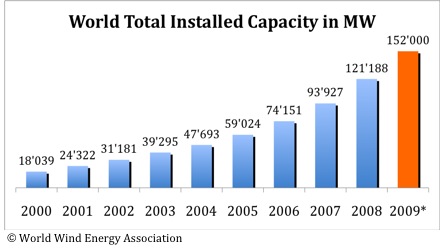Several recent posts here have looked at the state of play leading up to the 15th Conference of the Parties (COP 15) to the United Nations Framework Convention on Climate Change (UNFCCC). I’ve been generally optimistic about prospects – although the title of my last post may belie that. There are several reasons why I’m hopeful about things.
One of these has been expressed a fair number of times here: We are seeing progress on renewables and energy efficiency that, if you’d asked me ten years ago, I would’ve said I thought wasn’t going to happen – at least not in my lifetime. I continue to be delighted at how wrong I was. Today’s special section in the “NY Times” for instance, on the Business of Green, has a number of stories relevant to this theme, among them this one on what would really make clean tech companies happy. An agreement in Copenhagen is not high up the list. “What matters far more in the near term, the companies say, are national governments’ efforts to provide incentives for developing technologies like wind and solar power or cellulosic ethanol.” Further, this industry “…has already begun to find its footing, both in the United States and abroad, without any recent international action on climate – although concerns about emissions as well as energy security are clearly the driving force.” I would not hesitate to add that money – spelled s.a.v.i.n.g.s. – is another huge impetus. Green economic stimulus in the US and elsewhere are yet another positive factor.
This special “NYT” section has other great articles including on how successful energy efficiency initiatives may well have flattened out our consumption for the long run. It is precisely the following sort of perspective that absolutely makes my heart sing: “In April, Jon Wellinghoff, the chairman of the Federal Energy Regulatory Commission (FERC), said that because of the combination of renewable energy and energy conservation, the United States might not need to build any coal or nuclear plants to meet the base-load capacity that runs around the clock and is supplemented by natural gas and other sources at peak periods. ‘We may not need any, ever,’ he said.” The Smart Grid is going to further drive that devoutly wished for outcome.
One of my favorite writers, Andrew Leonard over at Salon.com, had this essay yesterday about how renewables can sneak right up on you. (I cited Leonard’s take on the virtually limitless potential for renewables here a while back.) He’s talking here about how the windpower industry in Texas has just exploded over ten years, from 180 MW to 6.223 GW just this month. Worldwide, windpower capacity is burgeoning. The World Wind Energy Association (WWEA) says that wind energy continued its growth in 2008 at an increased rate of 29%. See this chart.

A few more thoughts, if I may. I quoted Amory Lovins here recently saying that “The Renewable Revolution has been won.” This was echoed by Peter Löscher, the head of Siemens, in this recent “FT” article: “The green revolution has started and by 2020, green technology will have surpassed the car industry as well as the engineering sector in Germany.” Sweet.